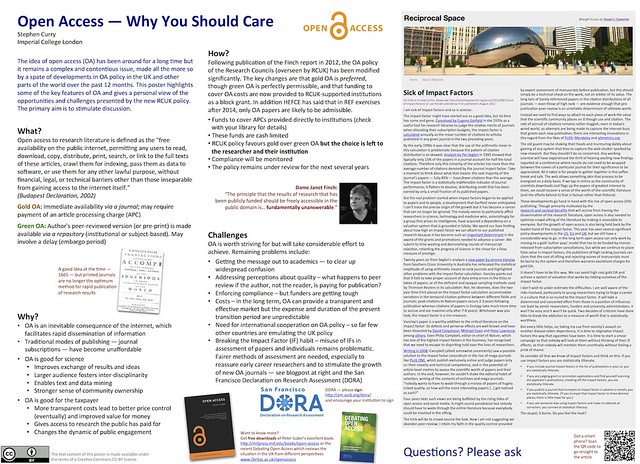Having devoted a fair number of the words on this blog to open access over the past year and a half, I have found myself invited to an increasing number of meetings on the topic. Whether run by RLUK, the Royal Society or the LSE, these meetings have invariably been interesting, but they often seem to bring together many of the same people, mostly from libraries, funders, publishers and learned societies.
And when we get together at some point one or the other of us bemoans that fact that despite holding all these meetings, the word on OA and the policy developments in the wake of the Finch report, appear to be diffusing only slowly into the world of academia. I have little doubt that there are many librarians around the country working hard to bring their faculty members up to date — and the British Academy has recently done some sterling work. Nevertheless I sense that progress is on the slow side.
On a couple of occasions I have suggested that funders might usefully support sessions on open access at regular conferences — to catch scholars unawares, as it were — but confess that I haven’t done enough to follow up the suggestion. But when I was turning my mind last month to an upcoming conference, I decided to get off my backside and have a go at some direct action. I contacted the organisers who kindly gave me space for a poster on open access and a short spot in the program in which to advertise it.
And so, last Thursday, at the end of the first session of Translation UK 2013 (devoted mainly to the regulation of the initiation of protein synthesis from messenger RNA — lovely talk by Marvin Wickens, by the way), I stood up to tell the assembled researchers about open access. I told them that, if they hadn’t heard so already, the UK policy on open access had undergone a significant shift on April 1st 2013, that the Wellcome Trust was getting tough on compliance, that HEFCE was considering its position, and that, while the notion of open access seemed to have broad support in the research community, the issue was complex, contentious and, for some, a little bit scary. I directed them to my poster where I had tried to summarise the key developments and challenges.
I spoke for a minute, maybe two, but that was enough. I’m not sure how many saw the poster — the sessions were crowded and busy — but practically everyone I spoke to in the breaks wanted to talk about open access. Many of the questions were ones that have been rehearsed at length in the blogosphere but it’s worth bearing in mind that such discussions don’t touch the majority of researchers.
There were concerns about the sustainability of learned societies following the shift to OA (the meeting had generous sponsorship from the Biochemical Society, which runs a stable of journals), about how universities would formulate mechanisms for allocating their OA funds and, of course, about whether OA would prevent them from publishing in journals with the ‘right’ impact factors (one person even told me they had been given a list of recommended journals in which to publish!).
And there were questions about the details; I was surprised — though I guess I shouldn’t have been — to encounter several people who were not aware of the new funding arrangements or of the Wellcome Trust’s tightening of its compliance policy. I would hope also that by simply raising the issue at the conference, conversations were sparked that didn’t involve me.
It’s too early to say for sure but I think the experiment was at least a modest success. I would certainly do it again. With a longer lead time, I might aim to propose a short session of talks or Q&A which would allow the topic to be aired with even more people. If anyone would like to do the same as they head out on the conference circuit this summer, they are welcome to use or adapt my poster: I have deposited it (as a PowerPoint file) on figshare under a CC-BY licence.
Go on — let’s get the message out there.






Well done you for doing this.
“Go on — let’s get the message out there”. Quite.
I started doing this in 2007. Details and some other suggestions by Dr Bill Hooker at http://sennoma.net/?p=663
Thanks for the comment and the link – I’d not seen it before. Clearly there’s nothing new under the sun, even in OA!
great “direct action” work. I would differ with the strict defining of OA given on the poster, however, taken from the Budapest Open Access Initiative. This is an important early definition, but not how all people define OA: for example, not how it’s defined by Wikipedia, or by the most prominent OA advocates and BOAI signatories, Steven Harnad and Peter Suber, or in the widely referenced work “Open Access” by Suber. In these and many people’s views, and in common usage, there’s a range of publishing methods which might be called Open Access, ranging from CC0 public domain license to BY, NC, ND, or SA restrictions, to embargos, to channel or functional restrictions. This reflects the varieties of scholar preferences and business models being explored by publishers.
Fair enough (though the poster also points readers to Peter Suber’s book for more information) — I can add in mention of the rights issue in my next version.
I guess that highlights the risk of going public without peer review… 😉